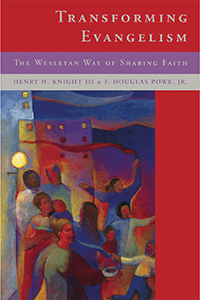To celebrate the Lewis Center’s anniversary, we are highlighting Leading Articles — some of our most popular posts of the past 20 years. We are pleased to share again this article by Doug Powe, originally published on December 5, 2018.
Lewis Center Director Doug Powe says biblical evangelism is characterized by four key practices — proclamation, community, service, and witness. Focusing on these practices can demystify the concept of evangelism and strengthen a congregation’s evangelistic efforts.
Many churches struggle with evangelism. For some, evangelism is an important objective, but the methods of pursuing it are vague or ineffective. For others, the term itself is uncomfortable, bringing to mind doctrinally rigid or manipulative ways of leading people to faith. Focusing on the characteristics of biblical evangelism can help demystify evangelism and strengthen our evangelistic efforts. Four key practices — proclamation, community, service, and witness — are rooted in scripture and proven effective in the history of the church.
1. Proclamation
The Greek word kerygma is often used for proclamation. In Romans 10:14, Paul writes, “How, then, can they call on the one they have not believed in? And how can they believe in the one of whom they have not heard? And how can they hear without someone preaching to them?” The key is the ending where Paul says, “And how can they hear without someone preaching to them” or in some translations “proclaiming to them.” This is the meaning of kerygma.
I am not a New Testament scholar, but I prefer to translate the term as proclaim because Paul is not talking about preaching as a professional occupation. He is talking about someone willing to share the good news verbally. When we interpret kerygma as something only done by professionals, it lets the majority of the congregation off the hook. I believe Paul is arguing the opposite — that all of us are called to proclaim the good news so that someone might hear it.
Too often individuals believe we pay the pastor to proclaim so we do not have to do it! And as we grow more comfortable in our congregations we tend to share less. And as a result, fewer and fewer of us are proclaiming the good news. We need to reclaim the understanding that all believers are responsible for the practice of proclamation.
2. Community
The Greek word for community is koinonia. The best model of Christian community is found in the Trinity and the way in which Father, Son, and Holy Spirit make room for each other’s gifts. The three-in-one God models for us what is possible when we are willing to share our gifts with the community and make room for the gifts of others. It is a community constructed on love, trust, and accountability.
Throughout the history of the church, community has been a key factor in successfully engaging new people. In the Wesleyan revival, for example, people found community with one another in societies, classes, and bands that were essential to their personal transformation. Today, many congregations try to mimic this approach in their small group ministries. But the results are often mixed because we copy the form of Wesley’s small groups while ignoring the rationale for connecting people. The goal cannot be simply to create small groups, but to connect people in an authentic way that engenders love, trust, and accountability. Our evangelism efforts today need to focus on connecting people in authentic community and not just copying a certain model of community.
3. Service
The Greek word for service is diakonia. In Ephesians 3:7 Paul uses a form of diakonia when he talks about being a servant of the gospel. The idea of being in service to something or someone is challenging in our culture because of the history of slavery. But the language of servanthood is prominent in Paul’s letters, particularly being a servant to Jesus. Paul understood his role as carrying on the work that Jesus started, and we are called to do the same.
To be in service to Jesus means engaging in holistic ministry that addresses someone’s entire being, body, and soul. Jesus provides for those in need while sharing the transformative power of the gospel. If, on the one hand, we simply respond to physical needs, we are merely providing a social service. On the other hand, if we are simply sharing the gospel, then we are not addressing the concrete challenges of our sisters and brothers. Holistic ministry in Christ’s service is always both/and. The idea of serving is never disconnected from an expectation of spiritual transformation.
The struggle we have today is we have disconnected service from an expectation of transformation through Christ. In an effort not to offend we do things for people and hope they figure out our Christian motivation. I am not suggesting clubbing people over the head with the gospel, but a holistic understanding of service must include sharing the transformative power of Christ. Too many congregations ignore the importance of letting others see the ways in which the love of God intersects with loving one’s neighbor.
4. Witness
The Greek word for witness is martureo. It is the root of the word martyr. The truth is, when we hear the word martyr, we immediately think of someone dying. Martyrs literally give their lives for the gospel. But we are not required to die to witness to Christ. In Acts 1:8 we find a form of martureo that is not about death. It reads, “you will be my witnesses in Jerusalem … to the ends of the earth.” A martyr or witness is someone who gives their whole being to something. It is more than proclamation because one’s entire life becomes a sign pointing to God. In Acts 1:8, Jesus is asking the disciples to devote their entire being to telling his story. What Jesus does not want is a half-baked effort. The disciples are to dedicate themselves to the work of witnessing.
For many of us, witnessing has become a technique rather than an expression of our spiritual identity. We see it as a means of getting people to our congregation. Many times when we witness people are not hearing about God’s transforming love. They hear “come to my church.” The Wesleyan movement was successful because witnessing was a part of the DNA and not a technique. We need to reclaim this dimension of witness.
These four practices should work together in an integrated, synergistic way. But too often, we make them into separate things, lessening the overall impact of our evangelism. A holistic, biblical approach to evangelism employs all four practices in ways that inform and enhance one another so that we share the gospel and move closer to God and neighbor.
This article is adapted from one originally published in Grace and Peace under the title “4 Characteristics of Wesleyan Evangelism”. In 2019, the article received an award from the Evangelical Press Association as one of the best evangelism articles of the year. Used by permission.
 Related Resources
Related Resources
- Transforming Evangelism: The Wesleyan Way of Sharing Faith (Abingdon Press, 2006) by Doug Powe and Henry H. Knight III
- 6 Keys to Sharing the Gospel in a Pluralistic Culture by Doug Powe
- Adopting a Missionary Mindset by Douglas Ruffle
If you would like to share this article in your newsletter or other publication, please review our reprint guidelines.






